After nine months at the helm of GRI, Tim Mohin is still, yes, still, enjoying his job and making waves in sustainability circles. An eternal optimist endowed with just about enough realism and an unshakeable vision of a future of sustainable development powered by corporate accountability and transparency, Tim has a lot to say. GRI is also 20 years old young, and though Tim Mohin has been leading it for a much shorter time, his experience as a practitioner and sustainability leader gives him the long perspective.
What prompted me to pound Tim with a barrage of tough questions was an interview with Bob Eccles published in Forbes a couple of months back. Tim is quoted as saying: "There is a narrative that has been running for a while now that portrays sustainability reporting organizations as in conflict with each other. The reality is that nothing could be further from the truth. I believe there is an increasing amount of harmonization in this space, whether it be GRI, or the UN Global Compact, SASB or the IIRC. Not only do we have longstanding partnerships with those organizations and others, but we are in fact all just after the same thing, which is sustainable development."
I beg to differ. I do not see harmonization between any of these organizations and there are new frameworks and reporting approaches popping up all the time, whether in relation to specific sectors, regulation, stock exchange listings or other independent initiatives. Investment analysts use their own proprietary methodologies that are not based wholly on one framework or another. Longstanding partnerships with organizations in this space may look nice on paper, but in practice, they have yielded very little in terms of simplifying the way companies report. I am sure it sounds nice to talk of harmonization and partnership, but the reality is that it is not yet yielding tangible benefits. The proliferation of Linkage Documents that enable some sort of correlation between GRI Standards and other frameworks further clutters the landscape.
One case in point is GRI's close collaboration with the UN Global Compact. Both organizations have been in dialogue forever and have signed more MOUs than Nobel has given out prizes. And yet, signatories to the UN Global Compact are still required to prepare a Communication on Progress in line with UNGC requirements at Advanced, Active or Learner level. In fact, the UNGC is very proud of its flagship reporting framework - as noted on its website.
There is a 31 page document making the connection between GRI G4 Guidelines and the UNCG COP(s). This states clearly that reporters using GRI must still include content relating to UNGC core elements, even if those have not been deemed material for the organization and therefore not required by GRI Standards. Frankly, just reading this linkage document made me crave for paracetamol-flavored ice cream. If there were a true spirit of harmonization, I would expect the UNGC to declare the demise of the COP and require all large company signatories to deliver GRI-based in accordance reports and all SMEs to deliver reports covering a subset of GRI indicators. The perpetuation of different frameworks compounded by the need to understand the link between them is about as useful as an iPhone at a mindfulness retreat. There are many examples where unnecessary duplication of requirements adds nothing to sustainable development. It adds only bureaucracy, budget and salaries for people charged with promoting different frameworks.
I asked Tim to explain his thinking about the positive extent of harmonization.
"I am coming from twenty years of practitioner experience. I can say that a fractured landscape has created confusion and burden for corporations and we have to pay attention to that. We have to look at how to dig a layer deeper and appreciate that there are different tools for different uses. It is not a reason for companies to become confused. There is real harmonization work going on. When I say harmonization, I am talking about when standard-setters are asking the same question in annoyingly different ways. Right now, we have an aspiration to work with SASB to align such questions. There are over two thousand different disclosure standards out there. Currently we are in Phase One, mapping the overlap and looking at where we can align and simplify. This is work we are trying to get funded. I am certainly seeing a change in collaborative spirit at SASB. When I first got this job, I went on a listening tour. When I got to SASB, it felt like we were competitors. I took the opportunity to appeal to a shared aspiration which is our end-goal to improve how information is used to advance sustainable development. That's the reason I took this job."
And the new thinking on the Sustainable Development Goals?
"My view is that work in industry sectors and work on the Sustainable Development Goals can merge together. When you look at a sector and what's material for that sector, and then overlay the SDGs, you can see there is a good degree of correlation. I am very keen to merge those streams of work."
What about the work GRI is undertaking to advance reporting by SMEs?
How would you summarize your thinking after nine months at GRI?"I am coming from twenty years of practitioner experience. I can say that a fractured landscape has created confusion and burden for corporations and we have to pay attention to that. We have to look at how to dig a layer deeper and appreciate that there are different tools for different uses. It is not a reason for companies to become confused. There is real harmonization work going on. When I say harmonization, I am talking about when standard-setters are asking the same question in annoyingly different ways. Right now, we have an aspiration to work with SASB to align such questions. There are over two thousand different disclosure standards out there. Currently we are in Phase One, mapping the overlap and looking at where we can align and simplify. This is work we are trying to get funded. I am certainly seeing a change in collaborative spirit at SASB. When I first got this job, I went on a listening tour. When I got to SASB, it felt like we were competitors. I took the opportunity to appeal to a shared aspiration which is our end-goal to improve how information is used to advance sustainable development. That's the reason I took this job."
"I have never been happier. This is certainly one of the highlights of my career. It's a fantastic cause and a fantastic organization. My only frustration is that there are so many ideas and possibilities, more than we can act upon at any given time. I have had to prioritize and manage expectations and focus but it's working out quite well. Running a not-for-profit is like running a business - we now have nearly 100 people around the world."
And the focus is?
"We have four key areas that we are prioritizing at present and we have reorganized our structure to meet the needs. (1) improving the quality of sustainability reporting (2) providing preliminary reporting guidance on sustainability topics that are new to the corporate reporting field (3) increasing reporting among small and medium-sized enterprises (4) promoting harmonization in the corporate reporting landscape. We are actively working in all these areas."
"There is more work to do in this area. We have gotten some funding recently to work with the investor community to define what is investor grade reporting and how GRI can make that happen. It's a big hill we have to climb."
"Ah yes, we'll be making an announcement on that soon. Watch this space!"
So, lots of things bubbling at GRI, including the tarmac on the Road to Harmonization. Tim Mohin is very consistent and clear in his purpose and intentions - to advance sustainable development and improve the value of reporting as a tool to help us all do that. In the meantime, defragging and optimizing the reporting framework hard drives continues to be somewhat of an elusive goal.
Elaine will be chairing the edie Conference on Smarter Sustainability Reporting in London on 27th February 2018




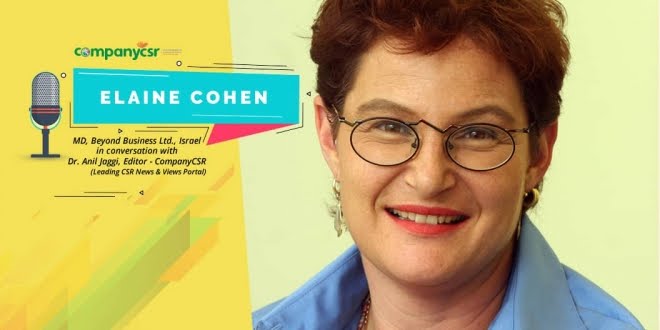
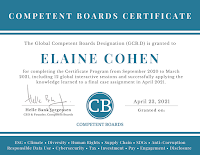


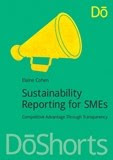
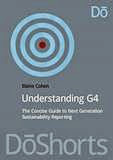
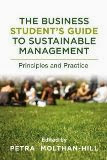
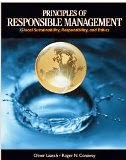
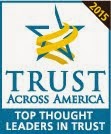










No comments:
Post a Comment